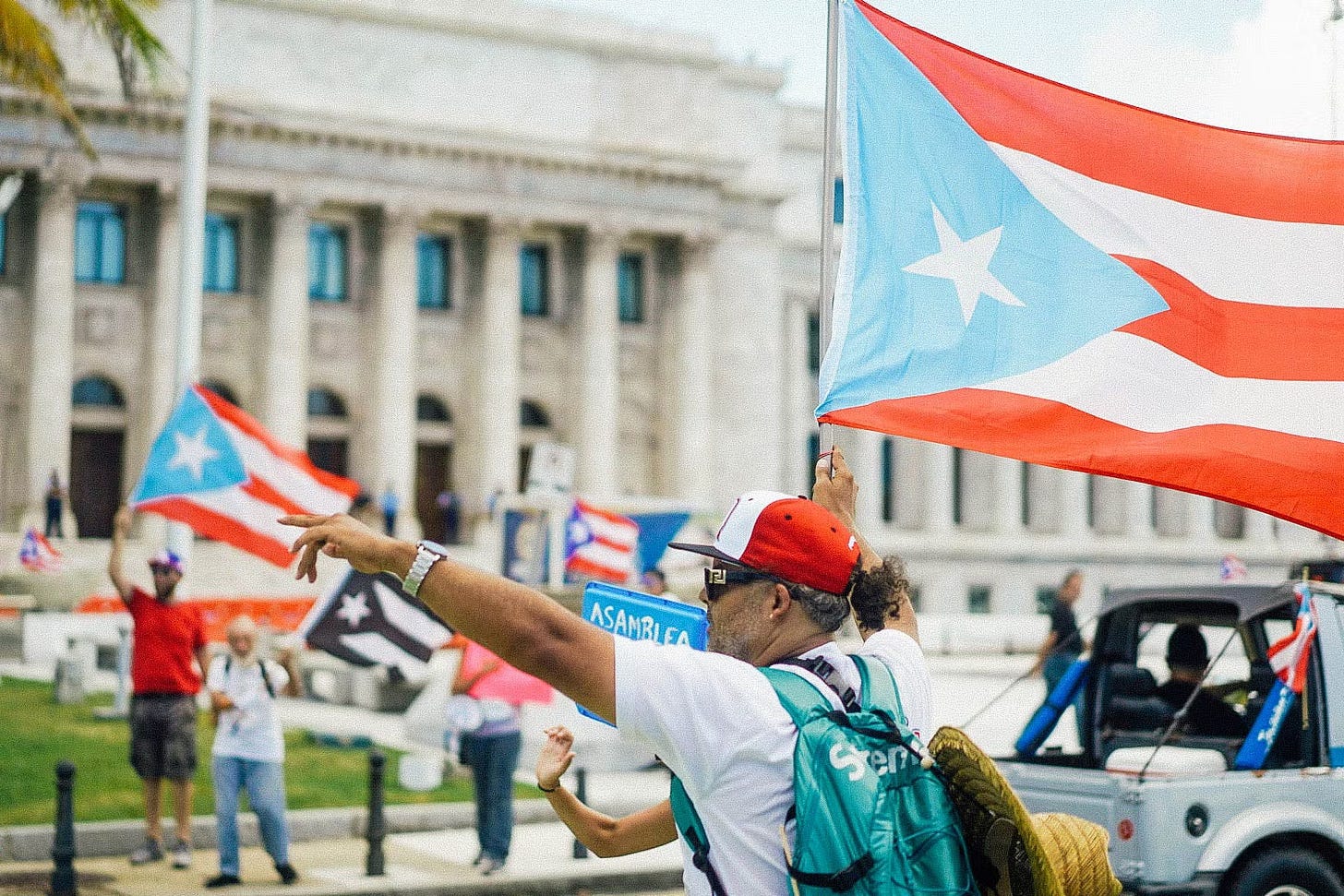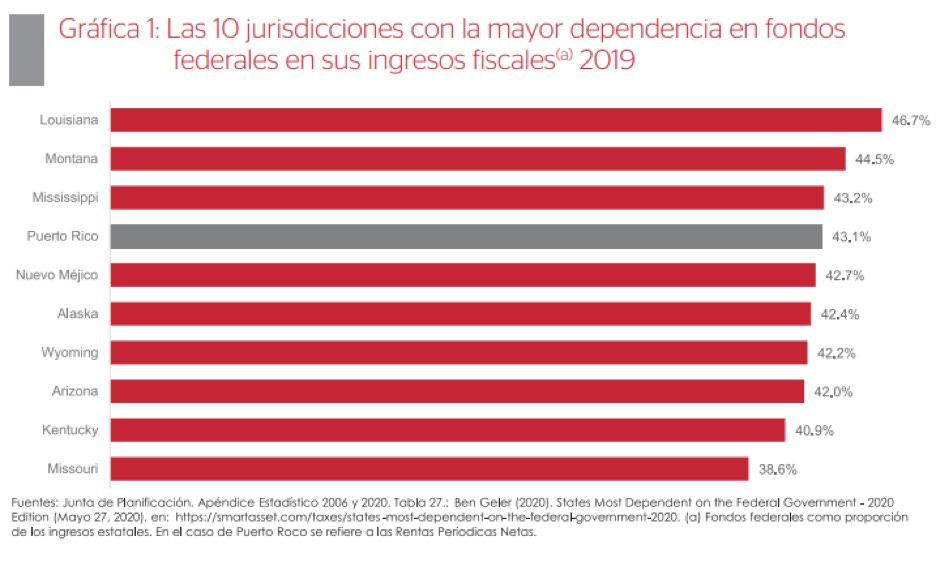Puerto Rico is a problem for the American people. The small island nation (yes, Puerto Ricans are a distinct people worthy of being called a nation) is a drain on American fiscal resources, a politically unstable mess, an economic basketcase, and most importantly a supplier of countless millions of immigrants which the American people never asked for and are not particularly fond of.
The only reasonable solution from a nationalist standpoint is to take the option that would best serve both Puerto Rico and the United States: separation.
Puerto Rico must go its own way, with all of its citizens and native sons, while the United States goes another. The separation should be smooth, orderly, and well-organized, but it must happen.
The current situation:
Puerto Rico is a fiscal drag on the United States. The island ranks 4th as one of the jurisdictions most dependent upon fiscal transfers from the Federal government. The island pays, on average, about $4 billion in taxes a year to the American mainland, but receives much more back. Some $25 billion in disaster relief has been spent on Puerto Rico since 2017 alone and the island’s tax dollars have not contributed to this amount, rather Puerto Ricans do not pay federal income tax and instead mostly pay Social Security and Medicare/Medicaid-related taxes, locking the money away for specific programs.
The island itself is in dire economic straights and is the only jurisdiction in the country that has its economy run directly by a Federal board of overseers. This board, the Financial Oversight and Management Board of Puerto Rico (called La Junta by locals), revises and approves the island’s budgets and public spending in accordance with the PROMESA Act. The act, and board, were created by the Federal government in response to the some $74 billion in debt that the island’s government had piled up.
PROMESA essentially allowed the Puerto Rican government to declare bankruptcy and restructure its debt. The island has since reduced its debt by 80% and been put on a more sound fiscal footing, but experts largely agree that this is a temporary calm that will likely expire when the oversight board is eventually dissolved. Meaning: Puerto Rico is expected to go back to its fiscally unsustainable habits after the watchful eye of Federal employees turns to other issues.
The American people do not deserve to deal with a perpetual crisis on an island thousands of miles from their shores, and they certainly do not deserve to deal with the consequences.
Puerto Ricans also make for poor neighbors. The homicide rate in Puerto Rico is 18.1 per 100,000 residents. This rate is three times the national average which stands at 6.3 homicides per 100,000 residents. Interestingly this rate also makes Puerto Ricans a unique violent demographic, even among Hispanics. The homicide rate for Hispanics in the mainland United States is 6.9 per 100,000 people, while the White American homicide rate stands at half the national average with a rate of just 3.3 per 100,000. The White American homicide rate is, therefore, 5 and a half times lower than the Puerto Rican homicide rate.
One of the main consequences has been that Puerto Rico, with its 45% poverty rate and astronomic crime, has exported a massive share of its population to the mainland United States.
5.9 million Puerto Ricans reside in the mainland United States, hundreds of thousands of which have arrived since the 2017 Hurricane which has necessitated so much Federal disaster relief spending.
The island, by comparison, has a population of just 3.2 million people, down from a peak of 3.8 million in the year 2000. In some states, like Connecticut the Puerto Rican population makes up a large share of the overall populace (8%) while in states like Florida or New York, there are huge numbers of Puerto Ricans, in both cases more than a million such individuals live in those states.
Cutting Puerto Rico loose:
The natural step is for the United States to cut Puerto Rico loose by giving the island full sovereignty and denaturalizing all mainland Puerto Ricans in the United States.
Puerto Ricans and their island are not afforded American citizenship by way of the constitution and instead were originally endowed with American nationality by way of Public Law 600 which was passed by Congress in 1950 and built upon earlier legislation, such as the Foraker Act, which made Puerto Ricans American nationals.
This may seem like a radical step but the transition would not be significant for the Island. Puerto Ricans resident on the island do not vote for president, do not send members to Congress (aside from a non-voting representative), and do not pay most taxes. Aside from Federal oversight the territory is largely politically isolated from the United States and is already involved in a litany of regional and international organizations in its own right.
Additionally, Puerto Rican laws grant Puerto Rican ‘citizenship’ (defined within the bounds of their US nationality) to any Puerto Rican resident of the island, born on the Island, or born to Puerto Ricans from the island. It would be reasonable, therefore, for the American government to denaturalize most if not all stateside Puerto Ricans and make provision to return them to a sovereign Puerto Rico.
As the US is Puerto Rico’s most significant trading partner it would also make sense to establish a free trade zone, even if a temporary one. The American government should allow Puerto Ricans to transfer assets, vehicles, and cash to Puerto Rico without taxation and through simplified processes and funding, perhaps $7,500 per head, should be made available to fund these relocations.
The most important factor remains that these two nations are tied together in a nearly 135-year-old union that makes no real sense for either party.
Some 5.9 million Puerto Ricans could be returned to their homeland while aiding in the restoration of the historic American nation to the unchallenged majority it once held.
Support White Papers’ mission to investigate and promote nationalist policies!
Zelle: whitepapersinstitute@protonmail.com
Buy us a coffee: https://www.buymeacoffee.com/wppi
Linktree: https://linktr.ee/wppi
Snail Mail: White Papers Policy, PO Box 192, Hancock, MD 21750




I’ve advocated this for years. This article articulates a fair and just separation of two incompatible peoples and outlines a practical solution to a 130 year old problem. White Papers for the W… again.